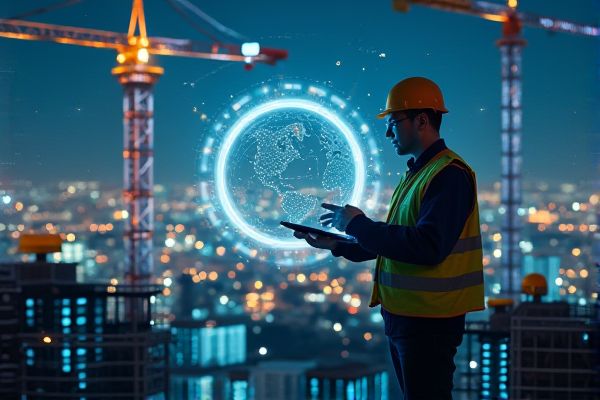
AI enhances efficiency in the construction industry by streamlining project management and logistics. Predictive analytics tools analyze data to foresee potential delays and resource shortages, thereby minimizing downtime. Robotics and automation improve safety on job sites, performing dangerous tasks while reducing the risk of accidents. Virtual reality and augmented reality applications enable real-time collaboration and design visualization, leading to better decision-making and reduced errors.
AI usage in construction industry
Predictive Maintenance
AI can enhance predictive maintenance in the construction industry by analyzing equipment performance data to forecast potential failures. This proactive approach may reduce downtime and repair costs, ultimately leading to increased productivity on site. For instance, employing AI-driven systems like IBM Maximo can provide valuable insights into maintenance schedules. Leveraging such technology offers construction firms a greater chance to optimize their operations and extend the lifespan of machinery.
Autonomous Machinery
Autonomous machinery in the construction industry presents significant opportunities for efficiency and safety improvements. Machines equipped with AI can operate in hazardous environments, reducing the risk of accidents for human workers. For instance, using autonomous excavators can streamline excavation processes, potentially decreasing project timelines. The adoption of such technology may lead to cost savings and enhanced productivity for construction firms.
Project Management Optimization
AI technologies can streamline project management in the construction industry by analyzing data for more accurate forecasting and scheduling. For example, using AI algorithms can predict potential delays by examining variables such as weather patterns or resource availability. These insights lead to better resource allocation, potentially reducing costs and improving timelines. Companies like Bechtel are already leveraging such AI tools, enhancing their operational efficiency through data-driven decisions.
Safety Monitoring Systems
Safety monitoring systems powered by AI have the potential to significantly reduce workplace accidents in the construction industry. For example, systems like Smartvid.io analyze images and data to identify safety hazards in real-time. This proactive approach can lead to improved compliance with safety regulations and reduce insurance costs. Enhanced safety measures not only protect workers but can also foster a stronger reputation for firms within the industry.
Construction Robotics
AI's implementation in the construction industry has the potential to streamline project management and enhance efficiency. Construction robotics, such as autonomous drones for site surveying, can significantly reduce time and labor costs. Predictive analytics can improve resource allocation, minimizing waste and optimizing schedules. By integrating these technologies, companies may increase competitiveness and achieve higher quality outputs.
Design and Planning Assistance
AI in the construction industry can enhance design and planning efficiency through data analysis and predictive modeling. For instance, AI tools can analyze past project timelines and budgets to forecast potential challenges for a new construction project at major institutions like MIT. Machine learning algorithms can optimize resource allocation, potentially reducing costs and improving project timelines. This technology allows teams to make more informed decisions, increasing the likelihood of meeting project goals.
Supply Chain Management
AI can optimize construction project timelines by predicting delays based on historical data. In Supply Chain Management, AI tools can enhance inventory tracking and demand forecasting, reducing waste and costs. For example, a construction company may leverage AI algorithms to streamline its procurement processes. This can lead to improved resource allocation and potentially increased profitability.
Quality Assurance Automation
AI can enhance quality assurance in the construction industry by automating inspection processes. For instance, using AI algorithms to analyze data from sensors can identify defects in materials or structural integrity. This reduces human error and can lead to significant cost savings for firms like Turner Construction. The integration of AI in quality control may also streamline compliance with safety regulations, increasing overall project efficiency.
Energy Efficiency Analysis
AI can significantly enhance energy efficiency analysis in the construction industry by optimizing resource allocation and reducing waste. For instance, tools like Autodesk's BIM 360 can analyze energy consumption patterns to suggest improvements. This approach allows for better design decisions that minimize energy use while maintaining functionality. Implementing AI-driven analytics can lead to long-term cost savings and a reduced environmental impact for construction projects.
Site Monitoring and Surveillance
AI usage in the construction industry can significantly enhance site monitoring and surveillance. For example, software like DroneDeck facilitates real-time aerial inspections, allowing project managers to identify potential safety hazards promptly. By analyzing data collected from sensors and cameras, AI can predict equipment failures, reducing downtime. This integration offers the chance to improve project efficiency and cost-effectiveness.
 techknowy.com
techknowy.com